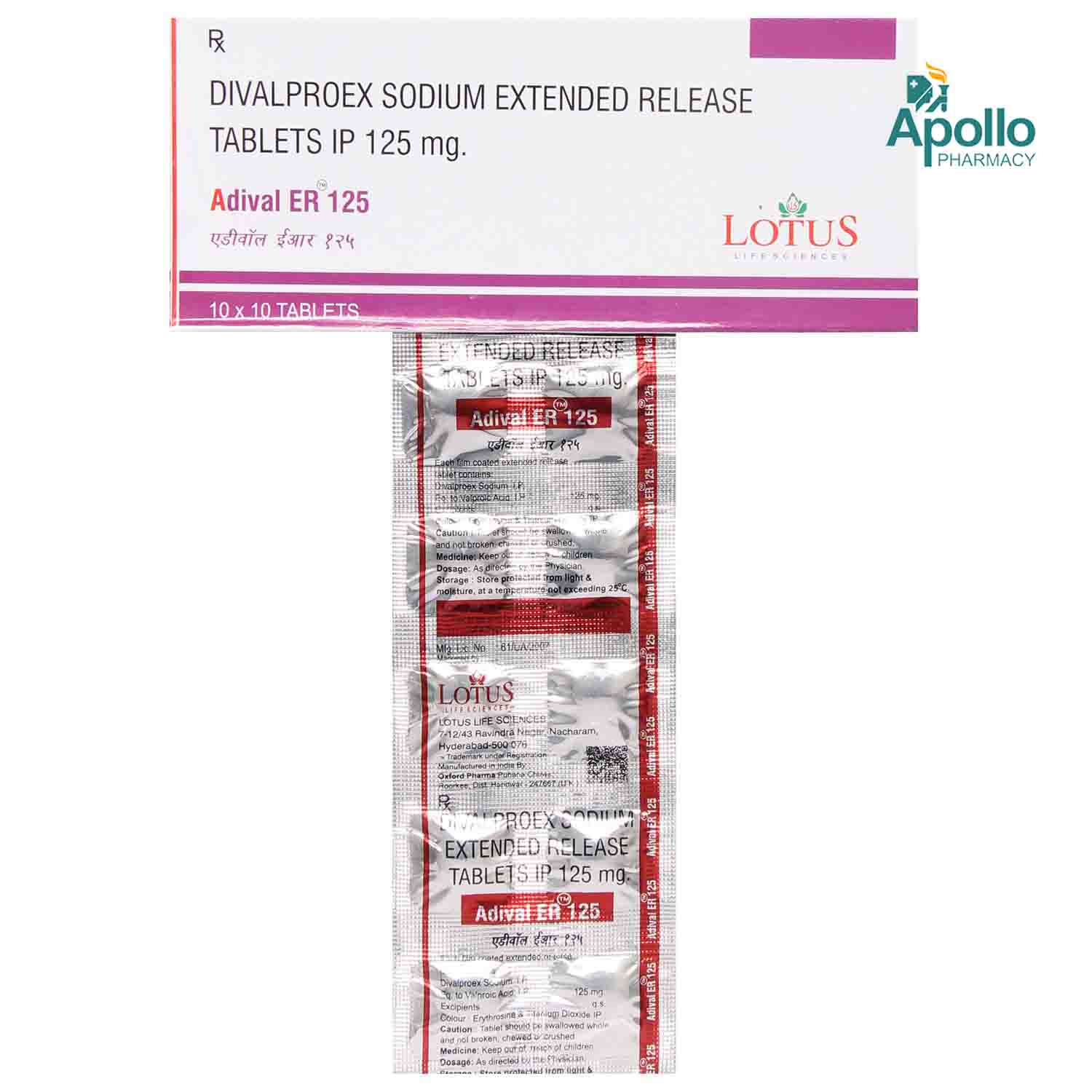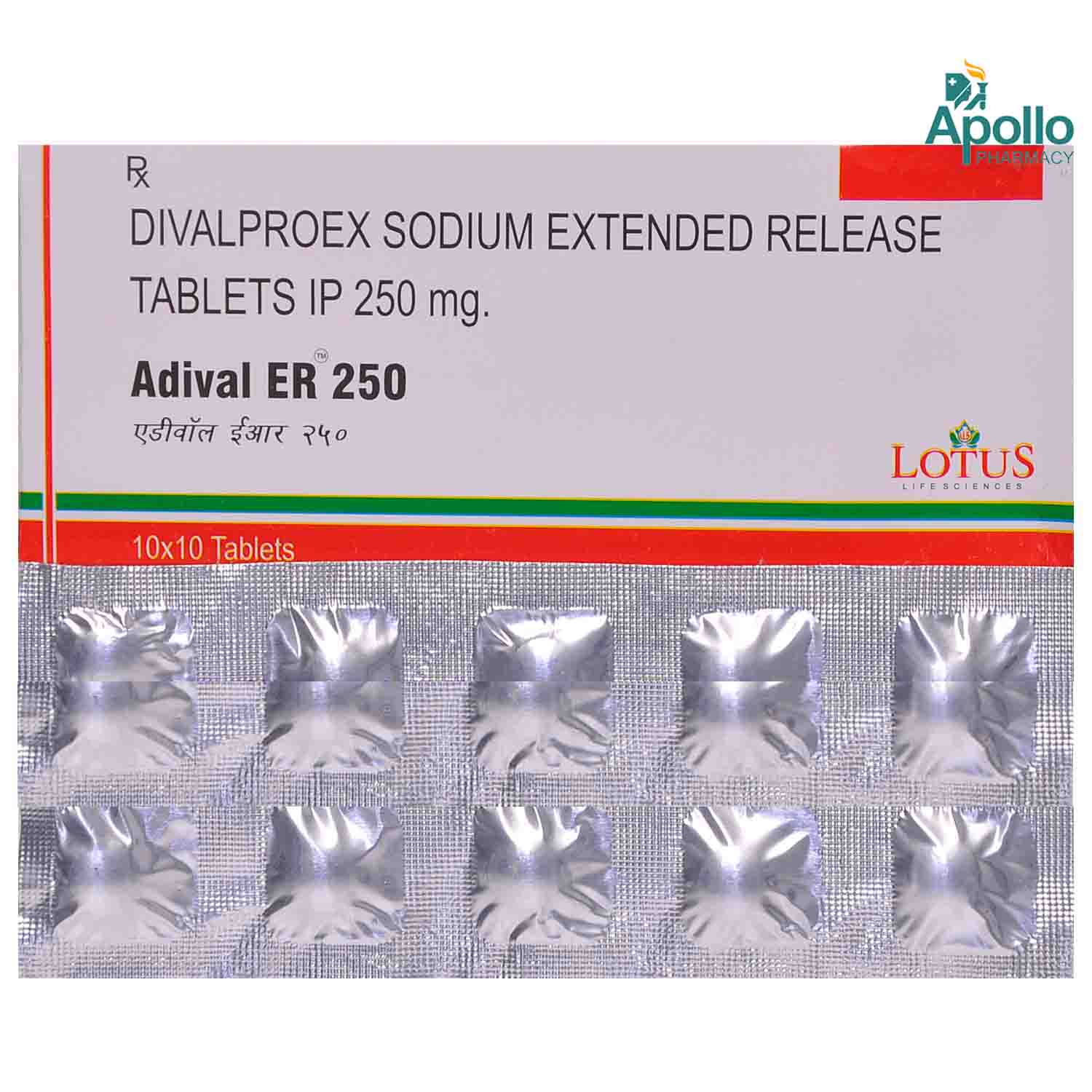Divalproex Sodium
About Divalproex Sodium
Divalproex Sodium is used to treat epilepsy, seizures or fits. Epilepsy is a sudden rush of electricity in the brain. In epilepsy, the brain's electrical rhythms become imbalanced, resulting in recurrent seizures.
Divalproex Sodium contains 'Divalproex sodium', which decreases the brain's excessive and abnormal nerve activity, thereby helping to control seizures.
In some cases, you may experience certain common side effects, such as abdominal pain, back pain, constipation, diarrhoea, dizziness, nausea, increased appetite, and vomiting. Most of these side effects do not require medical attention. However, talk to your doctor if you experience these side effects persistently.
Inform your doctor about your health, allergies, and medicines to avoid side effects. Do not take Divalproex Sodium if you are pregnant, as it could cause severe birth defects. Consult your doctor before taking Divalproex Sodium if you are breastfeeding. Use Divalproex Sodium cautiously in children under 2 years, due to higher liver risk in the first 6 months.
Uses of Divalproex Sodium
Medicinal Benefits
- Divalproex Sodium belongs to a group of medicines called anticonvulsants or anti-epileptics.
- Divalproex Sodium is used to treat epilepsy/seizures/fits. Additionally, Divalproex Sodium is also used to treat mood disorders and to prevent migraine headaches.
- Divalproex Sodium decreases the excessive and abnormal nerve activity in the brain. Thereby helps in controlling seizures.
- Divalproex Sodium treats mood disorders by increasing the amount of a chemical substance called GABA, which helps block the nerve transmission across the brain and provides a calming effect.
- Divalproex Sodium prevents migraine headaches by limiting the transmission of nerve pain.
- Divalproex Sodium is used alone or in combination to treat simple seizures, complex partial seizures, and complex absence seizures.
- Divalproex Sodium is used in combination to treat multiple seizures, such as absence seizures.
Directions for Use
- Divalproex Sodium can be taken with or without food, or as advised by the doctor.
- It is usually taken once daily; however, your doctor may adjust the dose and frequency based on your medical condition.
- Swallow Divalproex Sodium as a whole with a glass of water.
- Do not crush, chew, break, or open it.
Storage
Side Effects of Divalproex Sodium
- Abdominal pain
- Back pain
- Constipation
- Diarrhoea
- Dizziness
- Nausea
- Increased appetite
- Vomiting
- Vision problems
- Weight changes
- Problems with walking or coordination
Drug Warnings
- Do not take Divalproex Sodium if you are allergic to any of its contents, have/had liver problems, or urea cycle disorders.
- Inform your doctor before taking Divalproex Sodium if you have pancreatitis, blood problems, or multi-organ hypersensitivity.
- Consult your doctor immediately if you experience suicidal tendencies while taking Divalproex Sodium.
- Divalproex Sodium may cause thrombocytopenia (low blood platelets), hyperammonemia (high levels of ammonia in the blood), hypothermia (low body temperature), and liver problems.
- Please do not stop taking Divalproex Sodium without consulting your doctor to avoid worsening of seizures.
- Do not take Divalproex Sodium if you are pregnant, as it could cause serious birth defects.
- If you are of child-bearing age, use effective contraception while taking Divalproex Sodium.
- Avoid driving or operating machinery, as Divalproex Sodium can cause dizziness and may affect thinking and motor skills.
- Avoid consuming alcohol along with Divalproex Sodium as it could lead to increased dizziness.
- Care should be taken while giving Divalproex Sodium to children below 2 years, as there is a higher risk of liver intoxication during the first 6 months of treatment.
Drug Interactions
Drug-Drug Interactions: Divalproex Sodium may have interaction with pain killers (aspirin), anti-epileptics (pregabalin, topiramate, phenobarbital, primidone, phenytoin, carbamazepine, lamotrigine, felbamate, ethosuximide), anti-HIV (zidovudine), anti-depressant (duloxetine, escitalopram, amitriptyline, nortriptyline), anti-psychotic (aripiprazole, lurasidone, quetiapine), anti-anxiety (alprazolam), anti-TB (rifampicin), anti-coagulant (warfarin), antibiotics (imipenem, meropenem), and benzodiazepine (diazepam).
Drug-Food Interactions: Avoid alcohol consumption while taking Divalproex Sodium, as it might cause increased dizziness and sleepiness. Alcohol intake might also provoke seizures.
Drug-Disease Interactions: Divalproex Sodium may interact with disease conditions such as depression, liver disease, urea cycle disorders, suicidal tendency, HIV disease, and thrombocytopenia (low levels of platelets).
Drug-Drug Interactions Checker List:
Safety Advice

Alcohol
unsafeAvoid consumption of alcohol while taking Divalproex Sodium, as it may cause increased dizziness.

Pregnancy
unsafeDivalproex Sodium belongs to pregnancy category D. Avoid taking Divalproex Sodium if you are pregnant, as it could lead to serious birth defects. Consult your doctor for further advice.

Breast Feeding
consult your doctorDivalproex Sodium may pass into breastmilk. Consult your doctor before taking Divalproex Sodium if you are breastfeeding.

Driving
unsafeDivalproex Sodium causes dizziness and may affect thinking and motor skills. Do not drive or operate machinery until you are mentally alert.

Liver
unsafeDivalproex Sodium should not be used if you have liver problems or your family has a history of liver problems. Please consult your doctor if you have liver problems or any concerns regarding this.

Kidney
consult your doctorPlease consult your doctor if you have kidney impairment or any concerns regarding this. Dose adjustment may be needed in patients with kidney impairment.

Children
cautionDivalproex Sodium can be given to children if prescribed by the doctor. The doctor will adjust the dose depending on the child's body weight. Care should be taken in children below 2 years as they are at a higher risk of liver toxicity.
Habit Forming
Diet & Lifestyle Advise
- A ketogenic diet (low in carbohydrates and high in fats) is recommended for children with epilepsy. This diet helps in utilizing fat instead of glucose for energy generation.
- The Atkins diet (high fat and controlled carbohydrates) is recommended for adolescents and adults.
- Exercising regularly helps maintain weight and improve overall health.
- Rest well, get plenty of sleep.
- Avoid smoking and alcohol consumption.
- Meditation and yoga can help lower stress, decrease pain sensitivity, and improve coping skills.
- Have a seizure response plan, and help those around you know what to do.
- Prepare your living area; small changes may reduce the risk of physical injury during a seizure.
- Understand what triggers seizures and try reducing or avoiding them.
- Please pay attention to overall health, as it can help in reducing seizure activity.
- Install an alarm or emergency device to get assistance during a seizure attack.
Special Advise
- Regular monitoring of blood count and coagulation tests is advised while taking Divalproex Sodium as it may cause thrombocytopenia (low platelet levels).
- Divalproex Sodium may cause liver toxicity, usually during the first 6 months of treatment. Children below two years are at a higher risk. Regular monitoring of liver function tests is recommended before treatment, and at frequent intervals is advised.
- Divalproex Sodium might alter thyroid function tests and urine ketone tests. Inform the person doing the tests that you are taking Divalproex Sodium.
Patients Concern
Disease/Condition Glossary
Epilepsy (Seizures): Epilepsy is a sudden rush of electricity in the brain. It is a disorder of the nervous system that occurs due to disturbed nerve cell activity in the brain. In epilepsy, the brain's electrical rhythms become imbalanced, resulting in recurrent seizures. In patients with seizures, the typical brain electrical pattern is disrupted by sudden bursts of electrical impulses that affect an individual's consciousness, movements, or sensations. Seizures are of two types: generalized and partial seizures. Generalized seizures affect the entire brain, whereas partial seizures affect only a part of the brain. Seizures can cause uncontrollable muscle twitches and spasms. Stronger seizures may cause individuals to become confused or lose consciousness. Possible causes include high fever, trauma, genetic disorder, brain injury, or stroke.
Bipolar disorder (Manic depression): It is a mental health disorder that mainly affects a person's emotional state, causing intense mood swings. A person may feel extremely happy and full of energy (called mania or a milder form called hypomania) and at other times feel very sad and low (called depression).
Migraine: Migraine is a neurological condition characterised by intense headaches. Symptoms include nausea, vomiting, and sensitivity to light and sound.
FAQs
Divalproex Sodium belongs to a group of medicines called anticonvulsants or anti-epileptics used to treat epilepsy/seizures/fits. Additionally, Divalproex Sodium is also used to treat manic episodes associated with bipolar disorder and to prevent migraine.
Divalproex Sodium contains 'Divalproex sodium', which decreases the brain's excessive and abnormal nerve activity, thereby helping to control seizures. Divalproex Sodium increases the amount of a chemical substance called GABA, which helps block the nerve transmission across the brain and provides a calming effect. Thereby, it helps treat bipolar disorder.
Divalproex Sodium helps to treat manic episodes associated with bipolar disorder by increasing the amount of a chemical substance called GABA, which helps in blocking the nerve transmission across the brain and provides a calming effect.
Divalproex Sodium limits the transmission of nerve pain, thereby preventing migraine headaches. Migraine is a neurological condition characterised by intense headaches.
Do not discontinue Divalproex Sodium without consulting your doctor. To treat your condition effectively, continue taking Divalproex Sodium for as long as prescribed. Do not be reluctant to speak with your doctor if you feel any difficulty while taking Divalproex Sodium. Your doctor will reduce the dose gradually to avoid worsening of seizures.
Divalproex Sodium may cause weight gain due to an increase in appetite. Maintain a healthy weight by following a healthy diet and exercising regularly.
Use an effective method of contraception during the treatment with Divalproex Sodium. Avoid getting pregnant while taking Divalproex Sodium as it could lead to serious birth defects. Do not stop taking Divalproex Sodium and consult your doctor immediately if you become pregnant.
Divalproex Sodium may cause thrombocytopenia (low levels of platelets). This might increase the risk of bleeding and bruising. Be cautious while using sharp objects. Consult your doctor if you notice unexplained bleeding or bruising. Regular monitoring of blood count is advised while taking Divalproex Sodium.
Topiramate (anticonvulsant) should not be taken along with Divalproex Sodium as it may cause hyperammonemia (excess ammonia in the blood), hypothermia (low body temperature) and liver problems.
It is crucial to consult with your doctor before discontinuing Divalproex Sodium. Abruptly stopping this medication can lead to severe consequences, mainly if it's prescribed to treat conditions like epilepsy.
Divalproex Sodium is also used to treat mood disorders. It treats mood disorders by increasing the amount of a chemical substance called GABA, which helps block nerve transmission across the brain and provides a calming effect.
Divalproex Sodium can indeed make you sleepy. This is a common side effect of the medication. If you're experiencing excessive drowsiness, please consult your doctor.
Yes, Divalproex Sodium can cause hair loss as a side effect. While this isn't a common side effect, it can occur in some people. If you notice significant hair loss while taking Divalproex Sodium, it's essential to consult with your doctor.
Yes, Divalproex Sodium can potentially damage your liver. While this is a rare side effect, being aware of the risk is essential. Signs of liver damage may include yellowing of the skin or eyes or jaundice, dark urine, abdominal pain, light-coloured stools, nausea and vomiting. If you experience any of these symptoms while taking Divalproex Sodium, seeking medical attention is crucial.
Avoid consumption of alcohol while taking Divalproex Sodium, as it may cause increased dizziness.
If you experience abdominal pain, nausea, and anorexia while taking Divalproex Sodium, it's essential to contact your doctor immediately. These symptoms can be signs of a severe side effect, such as liver damage.
An overdose of Divalproex Sodium can be a severe medical emergency. The symptoms of an overdose may include heart block, excess sleepiness, and deep coma. If you or someone you know has taken an overdose of Divalproex Sodium, please seek immediate medical attention.







